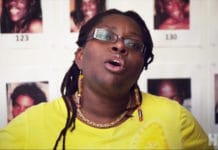Let the JOY begin: SambaFunk! Celebration of JOY Saturday, Dec. 17, at Vitus Oakland, 201 Broadway at Second Street and Jack London Square, Oakland
by Minister of Information JR

M.O.I. JR: How long have you been a dancer, and when did you become a dance instructor?
Theo: I’ve been dancing and drumming for roughly 20 years. I started drumming as a teen as a backup trap drummer in my grandparents’ Pentecostal church in East Oakland and dancing in college. I was exposed to West African dance and drum as a child, but I didn’t begin dancing until I left the Bay Area for college.
As a child my mom took me to a West African class held at Mosswood Park where she was meeting a friend. The stay was short but the rhythms stayed with me for years. I heard the drums calling until I found a West African dance class many years later as an adult in Atlanta.
In Atlanta I took classes with the Uhuru Dancers and various other African dance instructors, including Guinea Master Teacher Alseny Soumah. Upon my return to Oakland, I was introduced to Carlos Aceituno and Brazilian dance and drum by Regina Califa. The local Brazilian drum, dance and community was a perfect fit and I linked in. The rest, as they say, is history.
M.O.I. JR: What kinds of dance do you specialize in? Where are the dances from?
Theo: I have some modern dance experience as a student dancer under the late Dr. Danny Scarborough. However, my specialty is in cultural dance forms – West African, African Brazilian, and some African Cuban, African Peruvian and various African Latino social and carnival dances. I study and present carnival dances of the Americas, including North American New Orleans Mardi Gras and Second Line dancing. There’s a common cultural connection, and I like to expose the cultural similarities.

Theo: SambaFunk! is a movement. It’s a new expression of culture, community, dance and fitness. There are many components of SambaFunk! However, they all support the mission of presenting new cultural expressions, increasing the health and fitness activities in communities of color and exposing urban youth to exciting international possibilities.
On Saturday, Dec. 17, is a big day for us. We will have our SambaFunk! Celebration of JOY – our end of the year community holiday celebration, where the Funkquarians will be performing with special guests and local dj’s Henroc and Sake 1. Our thinking in planning this festivity was that there is so much trouble in the world, and many of our folks too often look for external stimuli to produce their personal happiness, we wanted to offer the community an opportunity to realign and refocus and tap into their inner power and realize that we are our own sources of happiness.
Many of our folks too often look for external stimuli to produce their personal happiness, so we wanted to offer the community an opportunity to realign and refocus and tap into their inner power and realize that we are our own sources of happiness.
Another goal was to create an event that could help usher in a new era of change in thought and approach. We wanted to present something festive that could begin to heal the community. Come ready to socialize, meet new people and celebrate your life. Let the JOY begin.

M.O.I. JR: What makes Brazilian dance different from traditional African dances as well as different from the dances created by Africans in the Americas?
Theo: Since Africans touched the shores of the “New World,” our influences have been immediately felt. In Brazil, African influences are easily identified in the music, dance and food. The strong traditions of the drum, call and response singing and chanting, and some religious and social traditions have remained in Brazilian culture. Brazil is the largest country in South America and home of the largest population of Blacks outside of the African continent. The state of Salvador is the welcomed home of African Brazilian lifestyle, and Bahia is the first capital city and original landing spot of the Portuguese explorers.
Upon my visit in January of 2011, I witnessed a strong African presence. Brazilian dance has retained many elements of traditional African dance; however, it has developed its own infectious style.
The most popular Brazilian dance worldwide is Samba – another African art form. In the ‘70s there was an interest in Funk, and a new genre of Samba Funk was created, while the ‘90s saw the infusion of Caribbean rhythms creating Samba Reggae. Contemporary Brazilian masters have infused modern dance with religious and social dances, creating new artistic expressions as well. In SambaFunk! we stay open to learning and expressing all of these aspects of African Brazilian culture. We regularly invite visiting masters to teach.
M.O.I. JR: How can people join your class?
Theo: We hold dance and drum classes weekly throughout the Bay Area. Our primary class, SambaFunk! Sundays is held every Sunday at the historic Malonga Casquelourd Center for the Arts, 1428 Alice St., in Downtown Oakland. Classes start at 4 p.m., dancing in Studio A and drumming in Studio B. All levels and walk up are welcome; no experience is necessary. Our group dances, drums, performs and parades.
SambaFunk! Sundays is also our training ground for participation in Carnaval and Carijama. Everyone is welcome to participate. Classes are $10 a session, but no one is turned away for lack of funds.
The People’s Minister of Information JR is associate editor of the Bay View, author of “Block Reportin’” and filmmaker of “Operation Small Axe,” both available, along with many more interviews, at www.blockreportradio.com. He also hosts two weekly shows on KPFA 94.1 FM and kpfa.org: The Morning Mix every Wednesday, 8-9 a.m., and The Block Report every Friday night-Saturday morning, midnight-2 a.m. He can be reached at blockreportradio@gmail.com.

 Store
Store





